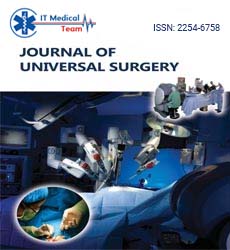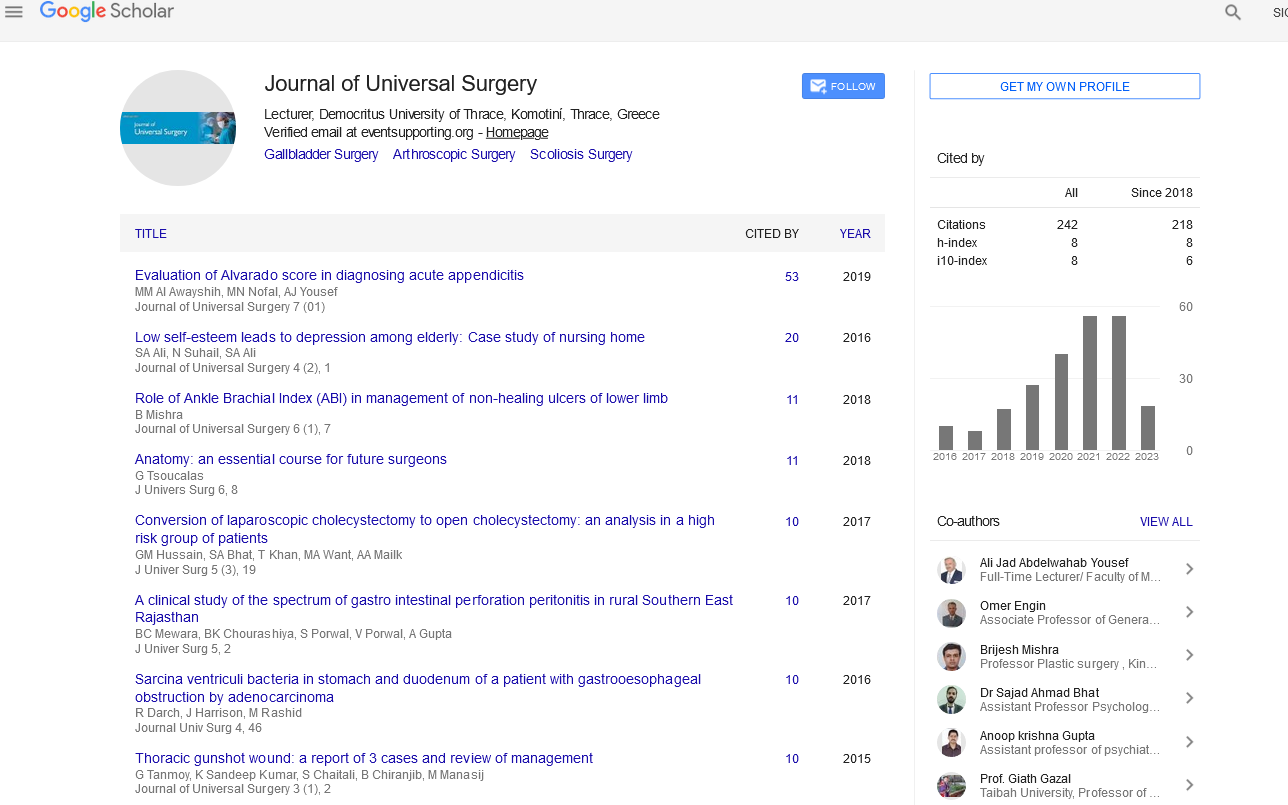Neha Halnure*
Department of Biotechnology, Osmania University, Hyderabad, Telangana, India
*Corresponding author: Neha Halnure, EMail-ID:nehahalnure21@gmail.com, Department of Biotechnology, Osmania University, Hyderabad, Telangana, India.
Citation: Neha H (2021) Colorectal Surgery: Postoperative Complications. J Univer Surg Vol.9 No.7:37
Colorectal medical procedure patients as often as possible experience the ill effects of postoperative entanglements. Patients with confusions have been demonstrated to be at higher danger for mortality, poor oncologic results, extra entanglements, and more awful personal satisfaction. Difficulties are progressively perceived as markers of nature of care with more utilization of hazard changed public careful data sets and expanding straightforwardness in medical care. Quality improvement work in colorectal medical procedure has distinguished techniques to diminish difficulty rates and further develop results in this understanding populace. Colorectal medical procedure is related with a high danger of bleakness and mortality in contrast with other general medical procedure subspecialties. By and large death rates following colorectal medical procedure range from 1 to 16.4%, with dismalness rates as high as 35%. Besides, following colorectal medical procedure, patients require the requirement briefly activity 2 to 5.8% of the time. The critical postoperative dismalness in this tolerant populace has been widely investigated with an end goal to distinguish regions for quality improvement and is progressively being designated by payers who are retaining instalments for preventable confusions. Likewise, there has been a developing accentuation on straightforward revealing of clinical results and a quest for strength explicit quality measurements to unbiasedly analyse careful quality across emergency clinics.
Postoperative complications
Postoperative difficulties happen in dependent upon 33% of patients going through colorectal techniques. Longo, et al., distinguished an entanglement pace of 28% in patients who went through colectomy for colon malignancy in the National Veterans Affairs Surgical Quality Improvement Program information base. A comparative inconvenience rate (27%) happened in an examination of in excess of 600 patients with ulcerative colitis who had colectomy. The most well-known difficulties following colorectal resection are irresistible, injury contamination or organ space disease, and Gastrointestinal (GI) motility intricacies, including ileus and entrails check. Wound difficulties, like contamination, hematoma, and dehiscence are normal after colorectal medical procedure, happening in up to 13% of patients. An investigation of SEER (Surveillance, Epidemiology, and End Results Program) Medicare patients with colorectal malignancy who required reoperation after introductory resection tracked down those injury difficulties represented 21% of re-operative cases. Anastomotic break or organ space contamination happens at a comparable pace of 3 to 10% and is answerable for 32% of reoperations in colorectal malignant growth patients. Despite the fact that meanings of ileus and incomplete little inside impediment differ generally in the writing, these problems are perceived as a critical wellspring of postoperative dismalness in colorectal medical procedure patients. Definitions fluctuate in which signs and side effects are incorporated (stomach distension, absence of gut sounds, sickness, heaving, absence of flatus, or potentially solid discharges) and term of ileus after medical procedure (24 hours–5 days). Delayed ileus after colorectal medical procedure is accounted for to go from 5.3 to 24%. Asgeirsson, et al., detailed the most elevated postoperative ileus pace of 24% utilizing the definition of > 3 scenes of emesis with return to NPO (nothing by mouth) status and additionally reinsertion of a nasogastric tube. The investigation additionally illustrated fundamentally higher complete 30-day scene of care costs for colectomy in patients with ileus ($16,600 vs. $8,300, p < 0.05). Albeit a significant reason for bleakness in colorectal medical procedure patients is straightforwardly identified with gut resection (contamination, GI dysmotility), these patients are pretty much as helpless as all medical procedure patients to other postoperative complexities. Up to 11% of patients experience cardiorespiratory difficulties, 5% have postoperative discharge, urinary intricacies happen in 8%, and venous apoplexy happens roughly 1% of the time. A more explicit breakdown of aspiratory difficulties in colectomy patients from the National Veterans Affairs Surgical Quality Improvement Program data set discovered pneumonia happened in 6.2% of patients and inability to wean from the ventilator happened in 5.7%.
39694





